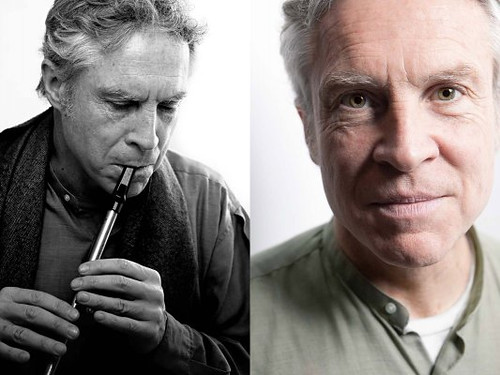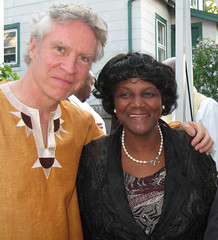For a man who says he isn’t religious, Anthony Donovan sure does spend a lot of time in churches. “I love entering these creative, beautiful spaces,” said Mr. Donovan. “I love the art.”
Mr. Donovan is the facilitator of Local Faith Communities, an ecumenical consortium of a dozen East Village religious leaders – from Buddhist, Hindu, Muslim, Catholic, Jewish, Russian Orthodox traditions among others – that meets periodically to discuss issues facing their congregations and how they can work together to solve them.
On Tuesday evening, the group will host Spiritual Sounds, a free concert featuring music from different religious traditions, at 7 p.m. at the Catholic Church of the Most Holy Redeemer on East Third Street.
Mr. Donovan, who is 58 and has lived in the East Village since 1990, has no formal religious training yet believes strongly in the importance of people finding their common bonds through divergent faiths. His hair is more salt than pepper, and he speaks and listens with the measured calmness of a therapist. He recently sat down with The Local to talk about Local Faith Communities and how living in the East Village has informed his work.
Why did you start Local Faith Communities?
This all started because I’m tired of what goes on in the name of religion — the hate crimes that are happening in the world because of religion, the wars in the name of religion. Religion seems to be a very easy way to mobilize people for or against something.
Interfaith is not a new concept. It’s age old, and there’ve been interfaith meetings that I’ve attended forever. I believe that getting together is fine, having a prayer service is fine, getting together and saying we love each other is fine, or that we appreciate each other is fine, but to me the thing that’s most important is the genuine relationship, getting to know somebody personally. We have a tremendous amount of lip service about community, but I don’t see a whole lot of it happening.
How do you define community?
A couple years ago I listened to a Hare Krishna talk about loneliness.I found his sharing so personal and so profound, and I was so moved by his sharing, and it was so genuine. So that’s what makes community. Taking the time to listen, to go into places, not just trying to be secure in your little bubble and cell and thinking of yourself and what you need.
What are some of the issues you’ve been discussing recently?
When we get together, we’re talking about our challenges: joblessness, homelessness, people not being able to pay rent, not getting healthcare.
Talk about the mission of Local Faith Communities.
For me, this is all preventative work. I don’t want to wait for the next terrorist attack for Muslims and Christians to start beating up each other. We really need to know each other personally now. I think that’s the power. Where is that imam to talk to? Is that imam going to feel completely isolated again at that next terrorist event? Or can we have the rabbi and people standing with him saying that we want to stop hate and prejudice here? I believe our biggest challenges are dead ahead of us, and the stronger the bond now, the more we’re going to be there for each other in the future.
How did coming to the East Village as a teenager in the 60’s influence the work that you do today?
The Fillmore East, which was on Second Avenue, wasn’t just about sex, drugs ‘n’ rock and roll for me. It was about people coming together. Jimi Hendrix’s message wasn’t just about drugs to me — he was talking about let’s all get together. It was very powerful coming to that place. I really felt the unity — blacks and whites, Hispanics getting together. The music was so powerful — feeling unity with people I had never met before — that was church for me.
What can people do on a community level to facilitate this type of discussion?
I would like everyone in their communities to ask their faith leader, “Have you met the rabbi, have you been to the Hindu temple over there? Do they know the people?” Just start, have tea or coffee. That I believe is important, and I hope this little movement that we’re doing is just an example that will help support people to do that. I still really think that there’s tremendous value in digging deep in your faith, but I think embracing another faith or understanding it can deepen one’s faith, one’s own religion.





